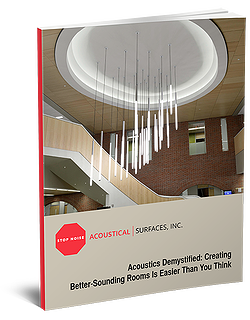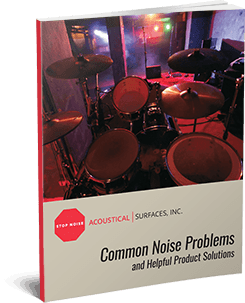The Complete Guide To Soundproofing A Hotel Room
People stay in hotels for lots of reasons. They can be a place to spend a restful vacation, celebrate a wedding with our family and friends, network with our peers at conventions, or simply get a good night’s rest after a long day on the road. No matter what brings us to a hotel, most of us are excited about getting some peaceful sleep on plush bedding at the end of it.
Some guests request rooms far from elevator banks or machines to guarantee quiet. Rooms on higher levels also help. The best solutions, however, are soundproof hotel rooms.
Why soundproof hotel rooms are a sound investment
Some hotels cater to millennials who want to party in the lobby until the wee hours. It’s an excellent option for those looking to socialize on their nights off, but not the best choice for someone who wants to wake up early and hit the road or make an early meeting. Even if they travel with earplugs and white noise machines, those band aids aren’t always enough to eliminate the disruptive noises coming from the neighboring rooms. This is why it can be important to use acoustic panels for hotel soundproofing.
We can’t choose our neighbors
Unless we’ve reserved a block of rooms, we generally can’t choose our neighbors when staying in hotels. If we need a solid eight hours for a meeting in the morning, the presence of a party in the adjoining room can be a nightmare. And don’t forget, it goes both ways.
If you’ve got a night away from the kids and want to celebrate with a hotel stay, it’s not ideal to have someone in the next room who constantly complains about your good time. At the end of the day, acceptable noise levels in hotels are subjective. With soundproof hotel rooms, both parties can find a happy place.
Soundproof hotels are attractive to guests
The idea that we can have a party in our rooms one night and a quiet space to recover the next makes a hotel with soundproofing more attractive to us than similar hotel options in the area might be. No matter the purpose of our stay, we don’t have to worry about who might be in the room next door. Additionally, sound carries through windows which makes it also important to soundproof hotel windows to ensure everyone who wants a quiet room has one.
Keeping customers happy
Noise is the number one complaint among travelers. Natural, as the main reason we book hotel rooms is for a place to sleep. Even an otherwise pleasant stay might be ruined by a noisy neighbor keeping us up all night. Soundproofing the rooms is a good way to keep your customers happy in every aspect of their stay and may save you from negative reviews online. Why do hotels have soundproof walls? It’s for the guests.
How to soundproof hotel rooms?
Depending on the construction of your hotel, soundproofing may be fairly simple, or it may require a pretty substantial renovation. If you’ve got an old building with thin walls and floors, you’ve got a lot of work to do to stand out above your local competition. How thick are hotel walls at your establishment compared to other hotels in the area?
On the other hand, if they already do a decent job of preventing sound transmission, some simple steps can put you on an even footing with even high end hotels with substantial soundproofing. The first part of it is learning how to make a room quieter. The second part is learning how to prevent sound transmission between rooms.
Keeping the rooms quieter
The easiest way to reduce the amount of sound that makes it into adjacent rooms is to keep the noise down in each room. When guests gather in rooms after hours, they tend to talk. As the sounds of their voices bounce off the walls and back into the room. The sound actually gets amplified due to reverberation, which makes people talk even louder. While you can’t control the volume of guest voices, you can keep it from getting out of hand. Giving hotel walls acoustic panel treatments is a great start.
Acoustical panels
Installing acoustical panels in the rooms will help absorb some of the sound waves that would otherwise bounce back into the room and build into a noise complaint. These sound blockers for walls are a great solution for hotel decor because their simple shapes and vibrant colors can be arranged to serve as modern art to improve the visual aesthetic in the room. You can even have them printed with whatever art you like and keep your brand consistent while implementing sound control measures.
Keeping the sound down is a good start, but guests will still make plenty of noise, and you’ve got to contain that noise to the room they’re in.
Preventing sound transmission
Sound transmission relates to the amount of sound that passes from one side of a barrier to the next. In the context of hotel rooms, the difference between low transmission and high transmission translates into positive or negative guest experiences. The best way to prevent sound from transmitting from one room to the next is by adding mass and density to the walls and floors that separate them.
Soundproofing the walls
The specific hotel wall construction in your building will dictate your course of action. Adding dense insulation between rooms is a good start. Adding more mass to the wall is better. If you are looking to take on a major renovation, you can add things like stud isolators to stop vibrations in their tracks or add high performance insulation.
If you are in the market for less invasive measures, you can add a second layer of drywall on top of the current drywall. Adding green glue or a mass loaded vinyl barrier between the layers will increase performance even more. Consulting with a professional will deliver the best results for your property.
Soundproofing the doors
Not all noise comes from the room next door. There is plenty going on in the hallways that could keep guests awake at night. Soundproof hotel doors keep them where they belong.
The first line of defense is the door itself. Make sure it’s solid. Hollow core doors may be fine for closets and interior doors for rooms that don’t require any privacy, but for a place where you will be sleeping, solid doors are the way to go.
A solid door will keep a lot of sound out, but if there are gaps around the edges, you’re back to square one. Adding seals around the edges and automatic door sweeps to the bottom will help complete your sound barrier. Automatic door sweeps raise and lower automatically, meaning they won’t drag across the carpet when you open and close the door.
Soundproofing the windows
Not only are hotel rooms soundproofed to keep the noisy neighbors from keeping us awake. They are also soundproofed to keep street noises out. Soundproofing windows isn’t as straightforward as soundproofing solid objects like walls, floors, and doors. However, there are alternate solutions that work quite well.
New windows
If you’ve got old windows that leak a lot of sound, it may be time for new windows. A new set of double glazed windows are a good soundproofing option because they add a second layer of glass to your window. This two pane design also has a sealed space in the middle that’s filled with gas, making them great insulators of sound and heat. Not only will new windows isolate a room from the exterior sounds, but they’ll keep your energy bills down too.
Window inserts
If you’ve got historical original windows that you want to keep for aesthetic purposes, you can still achieve the benefits of new windows without losing that old school charm. While they look great, the older windows can let in exterior noise, such as traffic noise, because the soundproofing material window seals have broken down over time. Another option includes the use of window inserts which are sealed panes that fit into your existing window frames, meaning they are cheaper to purchase and maintain, and you can install them yourself. Since larger hotels might have hundreds of rooms and windows, this cost savings can be significant. This process can result in noise reduction of sound waves which can provide a pleasurable experience for hotel guests.
Soundproof curtains
You’re going to hang curtains in each room anyway, so why not have them pull double duty. Not only are soundproof curtains fantastic at blocking out light so guests can get an afternoon nap in or snooze their alarms a couple of extra times, but this modern noise reduction curtains improves the acoustics in the room and keeps exterior noises where they belong.
Getting started
If you want to add the soundproof hotel rooms label to your listings, you’ve got to put a plan together. Locate potential sources of nuisance sound. Determine how much of that sound is making it into guest rooms. While you’re at it, determine what amount of sound transmission is acceptable to your clients.
Getting involved in a soundproof project as large as this will require some serious planning. It will also require the help of professionals who understand the technical aspects well enough to make sure it’s a successful endeavor.





